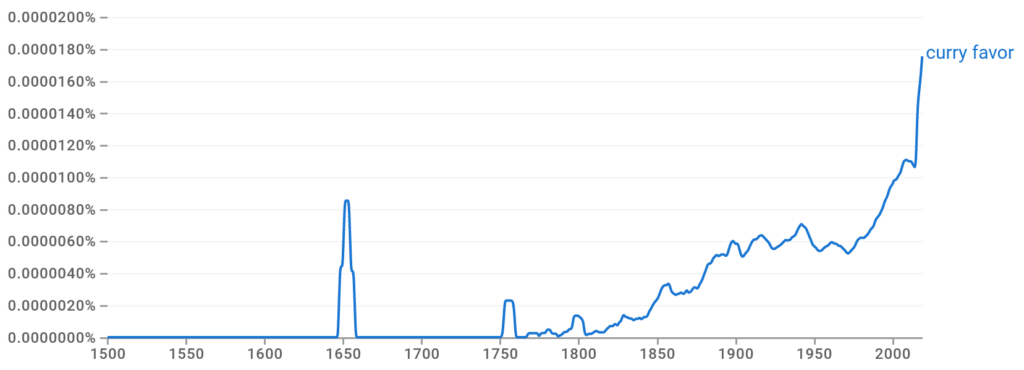Curry favor means to seek approval, support, or goodwill by using flattery or other ingratiating behaviors.
An idiom, like curry favor, is a phrase or expression whose meaning differs from the literal meanings of the individual words used. Idioms often convey cultural nuances, metaphorical expressions, or common social understandings. They play a crucial role in the English language by adding depth, vividness, and contextual richness to communication.
In this guide, I delve into the idiom’s deeper meaning, interesting origin, and proper usage in different contexts. I also provide examples of its use, practical tips for effective usage, variations, and related terms and phrases. So, keep reading to learn more about the idiom curry favor, and put your newfound knowledge to the test with the fun quiz at the end.

What Does the Idiom Curry Favor Mean?
The idiom curry favor means to seek approval by being very nice or overly attentive. When someone is trying to curry favor, they are attempting to win someone’s favor or gain their approval, often with the aim of gaining advantages or special treatment in return.
The Collins Dictionary defines the idiom as “to try to win favor by flattery, fawning, etc.” Similarly, Merriam-Webster defines it as “to seek or gain favor by flattery or attention.”
Recently, one of my neighbors went into raptures of delight over our glorious garden, especially the roses. I think she was simply trying to curry favor with me and grab an invite to our next barbecue!
Variations of the Idiom
The most common variation of the idiom curry favor is curry favour, which is the British variant of the phrase. Other variations include:
- Curries favor (present tense)
- Curried favor (past tense)
- Currying favor (continuous tense)
How Is the Idiom Curry Favor Commonly Used in Context?
The idiom curry favor is a versatile expression used to describe attempts to gain approval or advantages through flattery. Whether in professional settings, social interactions, political discourse, relationships, or business negotiations, this idiom encapsulates the act of seeking favor through complementary gestures.
Below, I share the different ways to use the idiom in different contexts, tips for effectively using it, and some real-world examples of its usage.
What Are the Different Ways to Use the Idiom Curry Favor?
- Expressing skepticism: “Do you reckon she’ll finish that job on time without trying to curry favor with the boss? Yeah, right!”
- Highlighting insincerity: “Murphy doesn’t really like your boss’s wife’s cooking. He’s only trying to curry favor to get that promotion he’s been after for years!”
- Express doubt about intentions: “Indra might bring you a cup of tea every afternoon, but don’t let that fool you. It’s only a way to curry favor and get away early on a Friday.”
- Highlighting strategic behavior: “Bellamy’s sudden interest in environmental issues seems more like an attempt to curry favor with the eco-conscious crowd than a genuine concern.”
- Highlighting opportunistic actions: “I know Octavia is always the first to lend a hand, but that’s just her way of currying favor with influential people so that she can climb the social ladder.”
- Expressing suspicion: “All those over-the-top compliments Kane gives seem to me like an attempt to curry favor than genuine admiration.”
What Are Some Tips for Using the Idiom Curry Favor Effectively?
- Context matters: This idiom is typically used when someone attempts to gain approval or favor, sometimes by using excessive flattery or ingratiation. Be sure the context of the conversation is appropriate for its use.
- Avoid overuse: Reserve this idiom for situations where it genuinely fits, as overuse could make your language seem insincere or forced.
- Combine with other phrases: Add variety to your language by using other idioms or similar expressions in combination with this one. For example, you might say, “She’s always trying to curry favor, but her actions speak louder than words!”
- Use the right tone: This idiom is often used to highlight someone’s attempts to gain favor in a less-than-genuine way, and it’s often seen as being negative or critical. So, be mindful of your tone and context when using it.
- Be aware of cultural nuances: As with all idiomatic expressions, cultural nuances play a role in their use. Be sure those you are speaking with understand the idiom or be prepared to explain its meaning if appropriate.
Where Can You Find Examples of the Idiom Curry Favor?
You’ll hear this idiom used in various forms of media, including TV shows, movies, books, public speeches, and online.
The idiom is also commonly quoted by some online news publications, like in these few examples:
Those who think that they are beholden to the very unions that are trying to desperately to maintain power and are answering to those people who are trying to curry favor, that is not what this is about,” Bevin said. (The Lexington Herald Leader)
He curried favor with fellow Democrats like President Woodrow Wilson and a rising assistant secretary of the Navy, Franklin D. Roosevelt, who looked favorably on San Diego’s warm-water port. (The San Diego Union-Tribune)
What Is the Origin of the Idiom Curry Favor?

The term curry favor is an eggcorn of the phrase curry Fauvel. Fauvel was the main character in the poem “Roman de Fauvel,” written by Gervais de Bus and Chaillou de Pesstain in the fourteenth century.
Fauvel was a chestnut horse that somehow moved into his owner’s home and became the master. In the story, various political officeholders and clerics sought his good graces.
How Did the Idiom Evolve Over Time?
The poem became well known in Britain, and the phrase currying Fauvel came to mean flattering a false leader for personal gain.
In time, the poem “Roman de Fauvel” was forgotten, and the phrase currying Fauvel turned into the eggcorn currying favor. The word curry, in this case, means to rub down a horse, derived from the Anglo-French word curreier, which means to put in order or prepare.
What Are Some Related Terms to the Idiom Curry Favor?
It’s easier to use the phrase correctly if you know some related terms and phrases, such as synonyms and antonyms:

Synonyms
- Seek favor
- Flatter
- Ingratiate oneself
- Brown-nose
- Butter up
- Suck up
- Creep around
Antonyms
- Defy
- Oppose
- Challenge
- Resist
- Contradict
- Disagree
Curry Favor: Test Your Knowledge!
Choose the correct answer.
What Have We Learned about the Idiom Curry Favor?
Curry favor is an English idiomatic expression that means to flatter, butter up, or be overly attentive to someone.
The phrase comes from a 14th-century poem about a chestnut horse called Fauvel, who managed to become master of his owner’s house. As a result, various dignitaries tried to win the horse’s favor by grooming or currying him, and the idiom curry favor eventually evolved.
Idioms like this are essential in the English language because they add creativity, color, and flair to our language and paint vivid word pictures for our audience.
If you’ve enjoyed unraveling the nuances of this idiom, there’s a treasure trove of similar guides awaiting your exploration on our site. Dive into more idiomatic expressions to enrich your language journey!
